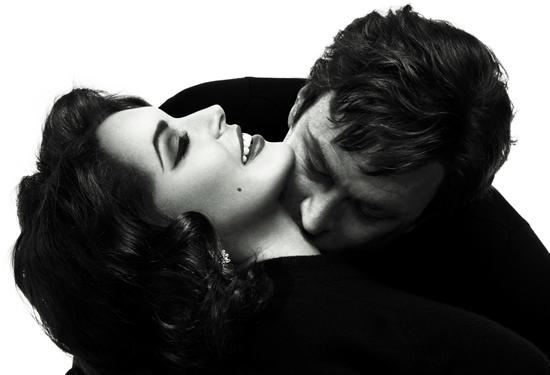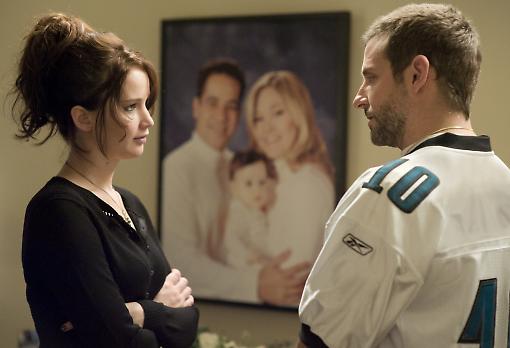When I asked a friend to come see David O. Russell’s Silver Linings Playbook with me, she groaned and said, “No.” Even after reminding her of the Oscar buzz surrounding the film’s release, she refused on the grounds that a) she wasn’t a fan of romantic comedies, and b) some reviewer said that it wasn’t reinventing the wheel. I offered c), what if a movie just gives the wheel a spin of its own? Can we quantify what’s groundbreaking? Why should that be the standard, anyway? My friend groaned some more—no dice. And since I only have one friend, I did what anyone in my position would do: I recruited my mother, whose opinion I trusted to settle the matter.
If David O. Russell was a world-renowned chef, then a movie like Silver Linings Playbook would be his special dish. It features his favorite and most effectively used ingredients—likable characters who are not wholly sane—mixed together in a sturdy pan designed for maximum flavor infusion. That’s essentially what’s happening in Silver Linings: Pat (Bradley Cooper) has just been released from an eight-month stint in a state mental clinic after nearly beating to death a fellow teacher who’s been getting extramarital with his wife. Said wife files a restraining order, but Pat thinks it’s only a matter of time before he wins her back. Meanwhile, he’s living in his parents’ attic, just a few steps away from his obsessive-compulsive father (Robert De Niro) and his loving, long-suffering mother (Jacki Weaver). A dinner party gone wrong introduces Pat to Tiffany (Jennifer Lawrence), a young widow-cum-recovering-sex-addict whose own neuroses gladly rise to the challenge of out-crazying Pat’s. To remind us that we are indeed watching a rom-com, however heavy the proceedings at hand may seem, a bargain involving dancing is struck, and on top of that, a bet involving the Philadelphia Eagles. The movie’s akin to throwing two betta fish in a tank and sitting back to watch the show. The whole time you can almost hear Russell’s laughter as he was adapting the screenplay from Matthew Quick’s novel of the same name.
There is a lot at play here that works. I, along with the rest of the world, have been a fan of Jennifer Lawrence since 2010’s Winter’s Bone. Since then her ascent to the A-list has been almost textbook, exciting largely because of her lack of any formal acting training whatsoever. Because of this, or in spite of it, Lawrence is fierce, dynamic, and startlingly relatable. As Tiffany she is especially mercurial, and she establishes gravity in scenes where Cooper cannot. I’ll have to contribute to the buzz and say the work Lawrence has put in here is indeed worth another Oscar nod. De Niro, also, is at his best, and I’d argue that the film’s emotional crux finds itself not in the central romance, but instead in his portrayal of a father fighting his own issues so that he might help his son fight his as well. That both actors have been given such an opportunity to shine is a testament to the power of the character-driven script—while not perfect, it makes for a compulsively watchable, occasionally laugh-out-loud funny movie.
Not everything’s gold (or silver) here, though. Russell’s camerawork is no more stable than the characters it focuses on. When he’s cutting away from speaking characters to focus on details—such as Pat’s clenched hands, adorned by the wedding ring he refuses to stop wearing—his work is immersive, and worth the shakiness. When he’s quickly zooming in on the neighborhood that is Pat’s entire world, however, it becomes jarring, and superfluous. We’re already invested thanks to the sharp script and slew of talented actors. Forcing a frame to rapidly hone in on a pair of Tiffany’s unworn flats is giving me nothing but nausea. This sort of frenetic aimlessness is echoed elsewhere: Pat’s friend Danny (Chris Tucker), who he met while institutionalized, literally comes and goes throughout the entire movie. In one scene he’s sitting in Pat’s living room, hanging with the family, only for the cops to show up a few seconds later to drag him back to the ward. Apparently he hasn’t been legally released yet? This happens no fewer than three separate times, and Tucker, who’s finally reining in his shriek, never actually gets an arc, or a discernible purpose to speak of.
Similarly, we experience a brief and bizarre subplot that’s sort of speaking towards cultural assimilation, as well as a set-up between strung-out Tiffany and her high-strung sister (a role played as well as it could’ve been by Julia Stiles) that’s never resolved. Meanwhile, as lead, Bradley Cooper is good, but I still can’t decide if he’s good-good or just Bradley-Cooper-good (kind of like Justin Timberlake in The Social Network, where his performance is just solid enough to stop you from wondering the whole time what he’s doing in this movie). Cooper has charisma, undoubtedly, and I bought his chemistry with Lawrence, but his charm never manages to compensate for his lack of presence.
Silver Linings Playbook doesn’t reinvent the wheel; my friend was right about that. But I’m still not sure if it had to. Because what it does—which is take what could’ve been a trite, tactless romantic comedy and infuse it with some brains and heart and an undeniable sense of life—is pretty damn good in its own right. Sure, Russell’s latest isn’t perfect, but hell if this wheel doesn’t make for a comfortable, mom-approved ride.
—Daniel Rivera

Yann Martel’s Man Booker Prize-winning novel,
, is a story that seems like it would be nearly impossible to transfer into an engaging movie. Ang Lee, however, manages the task with flying colors. The film follows the stirring tale of Pi Patel, a 17-year-old Indian boy and the only human survivor of the Japanese ship Tsimtsum. The aesthetically stunning journey of Pi and a Bengal tiger named Richard Parker introduces the audience to a human struggle difficult to grasp and yet so easy to understand.
Although the majority of the film takes place on the lifeboat that carries the two survivors, it is interwoven with flashbacks from Pi’s childhood in India and the adult voice of the narrator. The audience is first introduced to a middle-aged Indian man greeting a writer in his home in Montreal, Canada. We learn that, as a boy, he found protection in one religion, and that, by the age of twelve, he had managed to follow three. Pi’s family lived in the small South Indian city of Pondicherry, where his father was the local zookeeper. Later, a political conflict forced the Patel family to move to Canada. On the voyage to Canada, a storm compelled Pi to share a lifeboat with a tiger. His struggle for survival and simultaneous spiritual voyage are profound and cinematically daring, so much so that the audience finds itself wishing that the journey would never end.
At times, it is easy to believe that Suraj Sharma, the actor who played 17-year-old Pi, was on set with a real tiger. The possible existence of human spirit in the tiger’s eyes is of ongoing question in the film. Its CGI technology convinces the audience that there is. The tiger is realistic enough that he grows on you, and you find yourself worrying in equal amounts for him and Pi. The computer-generated imagery also succeeds in giving a magical beauty to the ocean. One catches oneself wishing to be in Pi’s position, just to witness it.
Oscar-winning director Lee has once again succeeded in giving the audience a cinematic pleasure with a genuinely inspiring story. The film stays true to the original source material, but does not put too many constraints on the visual adaptation. As incredible as the visual effects and the cinematic techniques are, the film is still fundamentally a faithful retelling of the original, breathtaking tale of Pi’s extreme journey to manhood. It follows the 227 days that he and the tiger spend at sea, fighting to keep their spirits high as they develop a relationship with each other. The present-day episodes, intended to bolster the plotline at the beginning of the film, are its weakest link. Although Irrfan Khan was wisely cast in the role of adult Pi, he initially distracts from the story’s central plot. As the story progresses, however, the shifts from young Pi to adult Pi increase awareness of the fear and suffering he experiences.
The film’s beauty is consistently impressive. The scene in which a whale capsizes Pi’s self-made raft in the middle of the night is just as stunning as one in which tears run down adult Pi’s cheek as he completes the immeasurably unique story of his journey to manhood. Life of Pi is an emotionally moving, bittersweet, visually inspiring cinematic experience, and, without a doubt, one of the top films of this holiday season.
—Ellen Rodnianski

“Visually interesting”: the only positive thing that came to mind as I fought not to change the channel during
, Lifetime’s made-for-TV biopic about Elizabeth Taylor and Richard Burton.
The movie was supposed to signal a career comeback for Lindsay Lohan (who has had several chances before) and also promised to capture one of the first fated-yet-doomed celebrity romances of modern times. It seemed a perfect match since Lohan could, supposedly, truly empathize with Taylor’s life trajectory. Both were child stars who became adults stalked by paparazzi, hammered by tabloids, and obsessively tracked in the public eye. Surely, Lindsay is the modern Liz. But just like the romance between Liz and Dick, the movie fell to pieces in a painful and less interesting way.
Maybe because of Lohan’s terrible accent? Chrissy Teigan (@chrissyteigan) said it best: “Lindsay Lohan had a better British accent in the parent trap and that is not a joke.” It really wasn’t a joke, since there were no attempts to mimic Liz Taylor’s famous lilt. After the first 30 minutes, I stopped keeping track of the number of times Lohan slipped into her own voice. All I could do was hope my ears would forgive me afterwards.
Maybe because there was no magic? As much as I wanted to believe in the romance and love between Liz and Dick (played by Grant Bowler), it just was not there. Bowler, who is great as Connor Owens in Ugly Betty, played Burton as pitiable, brooding mush, rather than a swashbuckling, debonair man’s man. Burton would never have simpered and sulked after not winning an Oscar for the second time. Bowler did. This did not fit well with a Taylor who seemed emotionally distant, if not dead.
Really, the emotional problem was the biggest problem of all. Not only was there a general lack of emotion, but there were also misplaced attempts at emotion, all of them cringe-worthy. The worst moment occurs when Liz and Dick sit side-by-side in a black room conducting an interview. It hurts to watch Lohan’s pitiable attempts at emotional depth while she simultaneously builds a protective public front. Perhaps Lohan’s inability to express genuine emotion stems from her continuous smearing in the tabloids, but that cannot excuse the sad portrayal she presents in the film.
One would think that just one ‘interview’ moment would be enough. Sadly, none of the people who would think such a thing were in the Lifetime editing room, and the clips plagued the entire movie, bringing down an already sinking ship.
Though Liz & Dick assaulted most of the senses, it was a feast for the eyes. The locations were gorgeous, as was the wardrobe. When the camera panned across a new location, I wanted to be there—in that exact place, at that time. Each outfit seemed meticulously cared for and crafted. Of course, Taylor’s extravagant outfits (and a few less flashy ones) were stunning and will, hopefully, be seen on socialites this upcoming season. I could feel the work, preparation, and love that went into the visual production. If only someone had taken the time to apply a careful mindset to the acting.
Maybe the writing was not the best in the world. Maybe the supporting cast members were not worthy of Emmys. Maybe it was the hype. Maybe a lot of things. What it comes down to, for everyone who watched and will watch Liz & Dick, is that Lohan did a subpar job of portraying Taylor. Lohan could never have transformed into Taylor. The expectations were high, and the attempt did not meet even their shadow. To all those ‘maybes’: the answer is, yes, those were certainly part of the problem, but it was Lohan who truly doomed this movie, and possibly her own future in film. Patton Oswalt (@pattonoswalt) said it best: “[#lizanddick] is sad bad, not fun bad.”
—Kunal Basu-Dutta








